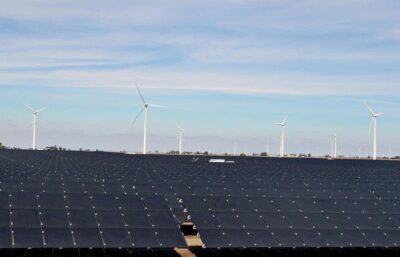The State of Illinois is overhauling how it will do energy. Late last night, the Illinois House passed the controversial green energy bill, Senate Bill 2408. The bill specifically requires the following:
* 50% renewable energy by 2040 and zero carbon emissions by 2045
• All privately owned coal generation closed by 2030; municipally-owned coal plants to reach zero carbon emissions by 2045
• $700 million in negotiated subsidies for 3 Com-Ed owned nuclear plants in the northern portion of the state for 5 years to sustain Illinois’ primary source of current clean energy
• Expanded apprenticeship and training programs for increased representation
• Strongest labor standards in the country on wind and solar developments
* Project labor agreements required on all utility-scale wind and solar projects and prevailing wages for all non-residential clean energy projects
• “Just transition” program for areas economically reliant on fossil fuel generation
• 1 million electric vehicles on the road by 2030, with state rebates funding up to 80% of charging station installation and requires prevailing wages on installation. This provision does not include electric motorcycles
• Increased energy efficiency for public schools
• Increased accountability and transparency — return to traditional rate-making vs. formula rates, and requires utilities to establish a chief ethics and compliance officer who must report to the Illinois Commerce Commission
The bill passed largely along party lines 83-33 with some Republicans crossing the aisle to vote in favor of the bill. Local representatives CD Davidsmeyer, Avery Bourne, Norine Hammond, Tim Butler, and Mike Murphy all voted against the bill.
Butler had especially pointed remarks to his fellow House members during the bill’s debate last night: “You drive through my district every time you come down to Springfield from Chicago. What you drive through is wind turbines, solar panels, and coal plants to come sit here at this building powered by coal. What this legislation will do will go against the wishes of my community who made a decision a decade ago under the Obama Administration and under a Democrat governor in Illinois who approved a state-of-the-art coal-fired power plant that sits on Lake Springfield that’s doing wonderful things, providing base-load power when you come here to Springfield and you go to turn on your lights at your apartment or your hotel room. What you are going to do is shut down that plant. That’s what this bill does. You are going to shut down a facility in southern Illinois in Representative Myers’ district. As I drove across Interstate 64 the other day, I looked to the south and I saw a few little puffs of white smoke coming out [of that plant]. All that has been said terrible about Prairie Power, I would encourage you to actually look at it and what that facility is. What this legislation will do will put my constituents, my neighbors, Representative Murphy’s neighbors on the hook for their utility bills, fully funding an out-of-commission power plant. Guess what? We are already tapped out on our property taxes. Every dime that I pay in property taxes goes to pension debt. Now, you are going to say that every dime I pay in my utility bills is going to out-of-commission power plants. I don’t have my head in the sand on this issue. I voted for FEJA a few years ago. As I said, I have a district that is home to more renewable energy than almost every one of you who are going to vote for this bill. I know what it is all about. This is not the right path forward. When you turn off these power plants in Southern Illinois…mind you, MISO – the power grid that covers most of Illinois geographically, when you turn off these power plants, we are going to be getting power from that coal plant that I saw just across the river in Indiana last week, that coal plant that I saw just across the river in Kentucky last week. 50% of the energy generated by MISO comes from coal. You’re not doing what you think you’re doing with this bill. You’re putting people out of work. You’re raising rates on my constituents. You’re shutting things down that shouldn’t be shut down.”
Several groups have warned that the bill will cause a 3-5% municipal utility increase to resident of the state. The Illinois Senate is set to reconvene on Monday to approve the House’s amendments and send the bill to the Governor’s desk.




